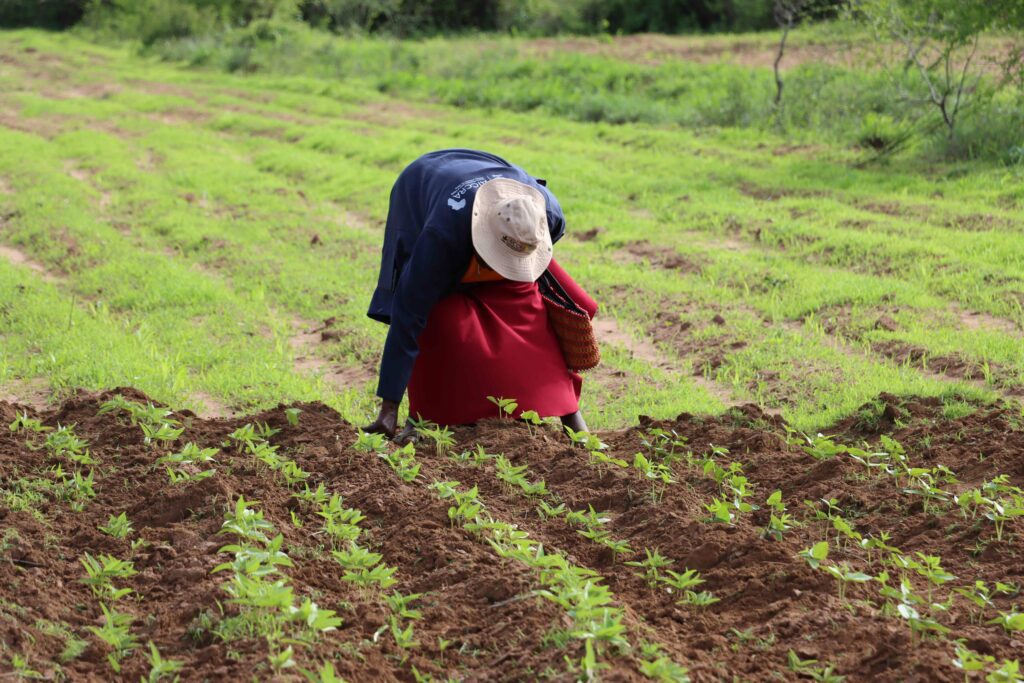
Sunday, March 2nd 2025

By Esther Nzuki, Science Communicator at the Alliance of Bioversity International and CIAT.
In the arid lands of Makindu, Eastern Kenya, over 600 women farmers are transforming agriculture. Faced with erratic rainfall and financial challenges, they are combining modern methods, cooperative models, and indigenous knowledge to achieve food security and economic stability. These efforts have led to resilient farming systems that feed families, educate children, and empower women. The establishment of the Kimatwa Women SACCO (Savings and Credit Cooperative Organization) was a crucial step in improving their agricultural prospects. “Through this cooperative, women access low-interest loans to invest in farming inputs such as drought-resistant seeds. They also benefit from education programs and emergency financial support. Around 81 farmers have returned with seeds as we plan to establish an aggregation center,” says Theresia Ngoze, the SACCO’s chair lady. This aggregation center will allow women to collectively store, process, and market their produce, increasing incomes and market access.
Indigenous Knowledge
The farmers leverage indigenous knowledge to enhance their agricultural practices. They use tree species (acacia tortillis, jacaranda) for rain forecasting, preserve seeds in dry jerry cans, and manage pests organically with neem trees. By burning cow dung at night, they repel armyworms. Combining these traditional methods with Climate Smart Agriculture (CSA) technologies creates a resilient farming model. For instance, they pair traditional weather prediction techniques with Climate Information Services (CIS) to optimize planting cycles, thereby improving resilience to climate shocks and promoting sustainability
Climate-Smart Agriculture in Action
The Accelerating Impacts of CGIAR Climate Research for Africa (AICCRA), through the cooperative, has introduced CSA practices to mitigate the impacts of climate variability. These practices include innovative techniques like planting basins and ripping that conserve soil moisture and enhance crop yields.
The success of CSA practices in Makindu owes much to the training provided by experts like Dr. Boaz Waswa, a soil scientist and an AICCRA researcher. He explains that the introduction of CSA technologies and practices, such as planting basins and ripping, has transformed the way farmers manage soil and
water conservation. “Planting Basins, these simple yet effective techniques involve digging small holes
where crops are planted.
The basins retain water and reduce evaporation, making them particularly suited to arid regions. Ripping on the other hand enables the breaking up of compacted soil layers, ripping enhances soil aeration and root penetration, boosting crop productivity. These interventions have
enabled farmers to make the most of limited rainfall and higher and more reliable yields despite challenging conditions”.Dr. Boaz Waswa
The transformative success of these innovations is evident in the lives of farmers like Patricia Mulu. At 38, Patricia embodies resilience and adaptability. With a loan from the SACCO, she purchased drought-resistant Nyota beans(Nyota) and maize varieties and adopted CSA techniques such as planting basins and ripping on her two-acre plot.
“Over the past two seasons, I’ve harvested enough to sell some, pay my children’s school fees, and still have plenty left for our food supply,” she explains. Patricia’s yields have doubled, giving her enough harvest even during unpredictable weather. She was able to harvest about 5 bags (90 kg) compared
to just 2 bags using traditional farming methods. Her story reflects the experiences of many women in the region, where the adoption of CSA has significantly improved food security and household income.
Overcoming Challenges Through Co-Design
Demonstration plots have been set up for practical learning, and climate information services have been integrated into training sessions to improve planning and decision-making. “The training has improved farmers’ understanding of the importance of CSA. Farmers seeing the benefits from the demos, have been motivated to uptake the technologies on their farms. This has led to wider adoption of the CSA leading to
higher and stable productivity”. Dr. Boaz Waswa The results of this initiative are tangible and significant. For example, Patricia Mulu’s income now covers her children’s school fees, household expenses, and savings.
This financial stability is a direct result of adopting CSA practices. Farmers have also embraced diverse cropping systems, which ensures they are not reliant on a single crop. Some of the drought-tolerant crops they have adopted include the highly nutritious Nyota beans, sorghum, cowpeas, and
maize. This farming technology not only improves nutrition but also reduces risks associated with crop failures.
Adopting new agricultural innovations requires time and careful problem identification. It involves co-designing and testing solutions in collaboration with users. This effort was made possible through teamwork among farmers, extension officers, and researchers. Makindu’s success underscores the importance of localized solutions that blend traditional wisdom with cutting-edge science. As the women farmers of Makindu continue to thrive, their journey serves as a beacon of hope for women farmers facing similar challenges worldwide. Through collective action and innovative thinking, they are not just surviving but thriving—one harvest at a time.


